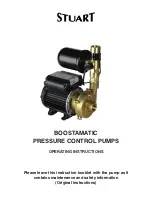
C-8
C.3.3
Annual Maintenance
Perform the following as a minimum to maintain pump dependability and optimum performance.
•
Check individual drain lines from the pump to the multi-drain to ensure proper drainage and
protection from freezing.
•
If installed, clean ESP primer.
•
Perform tank to pump flow rate test.
C.3.3.1
Check Drain Lines to Multi-Drain
Drains are supplied on the pump and piping at the lowest points where water could collect and
freeze rendering the pump useless. Most of these drains are piped together to a multi-drain to
allow the entire system to be drained by one valve.
It is necessary to inspect each line to the multi- drain to ensure the entire system is draining
when the valve is operated.
Inspect each connection and verify the individual lines to the multi-drain are free of debris. Re-
pair or replace any lines that are damaged, kinked, or corroded.
C.3.3.2
Tank To Pump Flow Rate Test
NOTE
This procedure is provided for basic information only. It does NOT supersede any lo-
cal procedure.
A.
Fill water tank until it overflows.
B.
Close tank fill line, bypass cooling line, and all pump intakes.
C.
Attach sufficient hose(s) and nozzle(s) to flow desired discharge rate.
D.
With pump in gear, open discharge to attached hose(s) and begin flowing wa-
ter.
E.
Increase engine throttle until maximum constant pressure is obtained on dis-
charge gauge. Record discharge gauge pressure.
NOTE
The bypass valve may be opened while the discharge valve is closed to prevent pump
overheating.
F.
Close discharge valve without changing throttle setting. Refill tank through
top fill opening or a direct tank line.
G.
Open discharge valve and adjust engine throttle to bring pressure back to
previously recorded discharge gauge pressure.
H.
Check flow at nozzle(s) using a pitot tube or flowmeter.
I.
Compare flow rate measured to NFPA minimum (or designed rate of the
pump).
NOTES
The pump should experience no mechanical problems, power loss, or overheat dur-
ing the test.
If the flow rate is lower, a problem exists in the tank to pump line. The minimum flow
rate should be discharged continuously until 80% of the tank is discharged.
Summary of Contents for AP
Page 2: ......
Page 28: ......
Page 71: ...59 Figure 19 One Piece Volute AP CBP MBP Figure 20 Three Piece Volute RSD...
Page 73: ...61 Figure 21 AP Pump Exploded View...
Page 74: ...62 Figure 22 CBP Pump Exploded View...
Page 75: ...63 Figure 23 MBP Pump Exploded View...
Page 76: ...64 Figure 24 RSD Pump Exploded View...
Page 77: ...65 Figure 25 Gearbox Exploded View All Except 3 74 1 GR...
Page 78: ...66 Figure 26 Gearbox Exploded View 3 74 1 GR...
Page 158: ...146 THIS PAGE INTENTIONALLY BLANK...
Page 174: ...C 12 THIS PAGE INTENTIONALLY BLANK...
Page 176: ...D 2 DATE HOURS RUN MAINTENANCE PROBLEM PART S USED REASON REPLACED INITIALS...








































